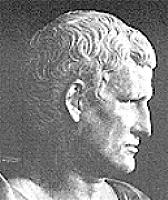Marcus Vipsanius Agrippa
|
|
Marcus Vipsanius Agrippa (63 BC-12 BC) was a Roman statesman and general. He was close friend, son-in-law and minister to Octavian, the future emperor Caesar Augustus. He was responsible for most of Octavians military triumphs, most notably winning the naval Battle of Actium against the forces of Mark Antony and Cleopatra.
| Contents |
Early Life
Agrippa was of humble birth, being born in the countryside outside of Rome. He was of the same age as Octavian and the two were close childhood friends. Octavian and Agrippa served as cavalry officers under Julius Caesar in the Battle of Munda in 45 BC. After the battle and return to Rome, Caesar adopted Octavian as his legal heir. As the senatorial factions within Rome grew more fierce, Caesar sent Octavian and Agrippa to study in Apollonia with the Macedonian legions. Caesar also sent the son of one of his friends, Gaius Maecenas, to study with them.
The three (Octavian, Agrippa, and Maecenas) developed a close friendship while away from Rome under Caesars orders. Agrippa quickly rose in favor within the Macedonian legions, the commanders taking note of his amazing leadership abilities. He also learned of architecture, learning the skills he would use later in his life. It was while studying at Apollonia when the news of Julius Caesars assassination in 44 BC reached them. By his and Maecenass advice, Octavian at once set out for Rome.
Rise in Power
After Octavians return to Rome, the three realized they needed the support of legions. Agrippa returned to Greece where he assumed command of the Macedonian legions (most notebly the Legio IV Macedonica) and marched them to Rome. Once Octavian had his legions, he made a pact with Mark Antony and Lepidus as the Second Triumvirate to handle the murders of Caesar. Agrippa fought alongside Octavian and Antony as Octavian's most senior general in the Battle of Philippi.
After their return to Rome, Octavian sent Agrippa in 41 BC to handle the war against Lucius Antonius and Fulvia Antonia, respectively the brother and wife of Mark Antony, which ended in the capture of Perusia in 40 BC. Two years later, he put down a rising of the Aquitanians in Gaul, and crossed the Rhine to punish the aggressions of the Germanic tribes. On his return he refused a triumph offered to him, but accepted his first consulship in 37 BC.
At this time Sextus Pompeius, with whom war was imminent, had command of the sea on the coasts of Italy. Agrippa's first care was to provide a safe harbor for his ships, which he accomplished by cutting through the strips of land which separated the Lacus Lucrinus from the sea, thus forming an outer harbor and an inner one was also made by joining the lake Avernus to the Lucrinus. About this time, Agrippa married Pomponia, daughter of Cicero's friend Titus Pomponius Atticus.
Octavian himself tried to conquer Sicily from Sextus, but was defeated in the naval battle of Messina in 37 BC and again in August of 36 BC. Then Octavian sent Agrippa against Sextus Pompeius. Having been appointed naval commander-in-chief, he put his crews through a course of training, until he felt in a position to meet the fleet of Pompeius. Then in 36 BC he was victorious at Mylae and Naucholus, and within a month, completely defeated Sextuss naval force. Agrippa received the honor of a naval crown for his services in Sicily.
Life in Public Service
In 33 BC, he was elected aedile, where he used his knowledge of architecture to his advantage. He signalized his tenure of office by effecting great improvements in the city of Rome, restoring and building aqueducts, enlarging and cleansing the Cloaca Maxima, constructing baths and porticos, and laying out gardens. He also gave a stimulus to the public exhibition of works of art. As emperor, Augustus would later boast that "he had found the city of brick but left it of marble," thanks to the great services provided by Agrippa under his reign.
Agrippa was again called away to take command of the fleet when the war with Antony and Cleopatra broke out. Octavians victory at Actium in 31 BC, which gave the mastery of Rome and the empire of the world to Octavian, was mainly due to Agrippa. As a token of signal regard, Octavian bestowed upon him the hand of his niece Claudia Marcella Major in 28 BC. He also served a second consulship with Octavian the same year. In 27 BC, Agrippa held a third consulship with Octavian, and in that year, the senate also bestowed upon Octavian the imperial title of Augustus.
In commemoration of the battle of Actium, Agrippa built and dedicated the building that served as the Roman Pantheon before its destruction in 80 AD. Emperor Hadrian used Agrippas design to build his own Pantheon, which survives in Rome. The inscription of the later building, which was built around 125, preserves the text of the inscription from Agrippa's building during his third consulship. The years following his third consulship, Agrippa spent in Gaul, reforming the provincial administration and taxation system, along with building an effective road system and aqueducts.
Late Life
His friendship with Augustus seems to have been clouded by the jealousy of his brother-in-law Marcellus, which was probably fomented by the intrigues of Livia, the second wife of Augustus, who feared his influence over her husband. The result was that Agrippa left Rome, ostensibly to take over the governorship of Syria - a sort of honorable exile, but, he only sent his legate to the Syria, while he himself remained at Lesbos and governed by proxy. On the death of Marcellus, which took place within a year of his exile, he was recalled to Rome by Augustus, who found he could not dispense with his services.
It is said that Maecenas advised Augustus to attach Agrippa still more closely to him by making him his son-in- law. He accordingly induced him to divorce Marcella and marry his daughter Julia Caesaris by 21 BC, the widow of the late Marcellus, equally celebrated for her beauty, abilities, and her shameless profligacy. In 19 BC, Agrippa was employed in putting down a rising of the Cantabrians in Spain. He was appointed governor of Syria a second time in 17 BC, where his just and prudent administration won him the respect and good-will of the provincials, especially from the Hebrew population. Agrippa also restored effective Roman control over the Cimmerian Chersonnese (modern-day Crimea) during his governorship.
Agrippas last public service was his beginning of the conquest of the upper Danube River region, which would become the Roman province of Pannonia in 13 BC. He died at Campania in March of 12 BC at the age of 51. His posthumous son, Marcus Vipsanius Agrippa Postumus, was named in his honor. Augustus honored his memory by a magnificent funeral. Augustus himself spent over a month in mourning. Augustus personally oversaw all of his childrens educations and even adopted Gaius Caesar and Lucius Caesar. It is believed that he did not adopt his youngest son, Agrippa Postumus, so that his old friend would have a son to carry on the family name.
Legacy
Agrippa was also known as a writer, especially on the subject of geography. Under his supervision, Julius Caesar's dream of having a complete survey of the empire made was carried out. He constructed a circular chart, which was later engraved on marble by Augustus, and afterwards placed in the colonnade built by his sister Polla. Amongst his writings, an autobiography, now lost, is referred to.
Agrippa left several children; by Caecilia Attica, a daughter Vipsania Agrippina, who became the first wife of the emperor Tiberius. By Claudia Marcella Major, Vipsania Marcella. By Julia Caesaris, three sons, Gaius Caesar, Lucius Caesar, and Postumus Agrippa, and two daughters, Agrippina the Elder, future wife of Germanicus, and Vipsania Julia, who married Lucius Aemilius Paullus.
Marcus Vispanius Agrippa, along with Gaius Maenases and Octavian, was a central person in the establishing of the principate system of emperors, which would govern the Roman Empire up until the Crisis of the Third Century and the birth of Dominate system.
See also
fr:Marcus Vipsanius Agrippa nl:Agrippa ja:マルクス・ウィプサニウス・アグリッパ pl:Marek Agrypa pt:Marco Vipsânio Agripa ru:Марк Випсаний Агриппа sv:Marcus Vipsanius Agrippa


